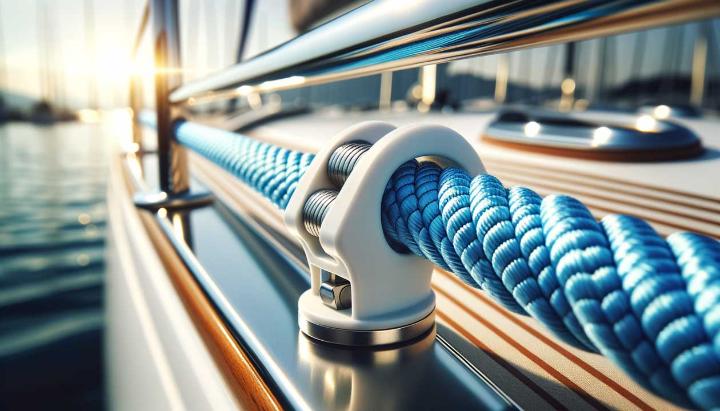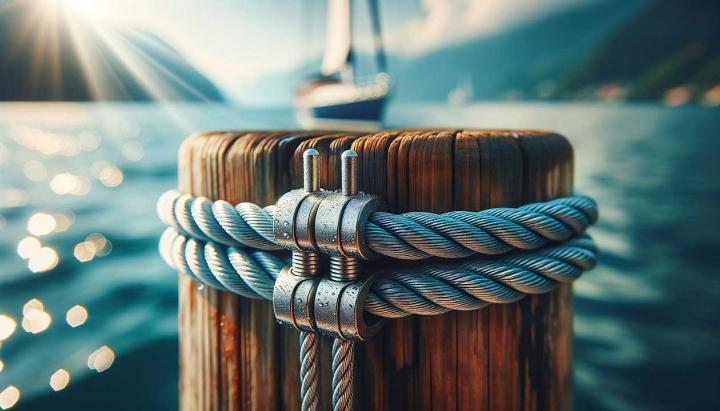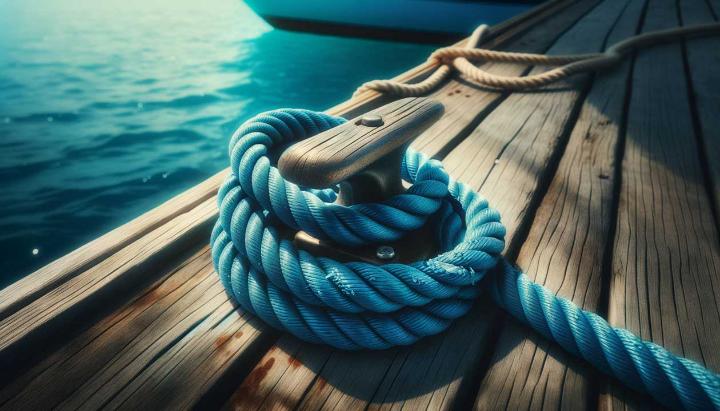Have you ever found yourself in a white-knuckle situation on the water, questioning the integrity of your boat's rigging? As a seasoned mariner, I can tell you that the difference between a close call and a catastrophe often comes down to one crucial factor: the quality of your marine rope and clamps. Welcome to iRopes' Essential Marine Boat Rope and Steel Wire Rope Clamp Guide, where we'll navigate the choppy waters of maritime safety equipment together.
In this comprehensive guide, we'll explore the intricate world of marine boat ropes and steel wire rope clamps, unravelling the mysteries behind their selection, installation, and maintenance. Whether you're a weekend sailor or a professional skipper, understanding these essential components is crucial for ensuring your safety and peace of mind on the open sea.
From the revolutionary UV-resistant technology in iRopes' Marine Rope Collection to the precise engineering of our boat rope clamps, we'll dive deep into the innovations that are setting new standards in maritime safety. Join us as we chart a course through the latest advancements in marine rope technology and discover why choosing the right equipment isn't just about compliance – it's about crafting unforgettable adventures on the water with confidence.
Understanding Marine Boat Rope: Essential Knowledge for Boaters
As a seasoned sailor, I've learned that choosing the right marine boat rope is crucial for safety and performance on the water. Let's dive into the world of marine ropes and explore the key factors you need to consider when outfitting your vessel.
Types of Marine Rope and Their Specific Uses
Marine ropes come in various materials, each with unique properties suited for different applications. Here are the most common types you'll encounter:
- Nylon rope is the go-to choice for docking and mooring lines. Its strength and elasticity allow it to absorb shock and resist abrasion, making it perfect for securing your boat in various conditions.
- Polypropylene rope is lightweight and floats on water, making it ideal for water sports and temporary buoy lines. However, it's not suitable for long-term use in sunlight due to UV degradation.
- Polyester rope offers excellent strength and low stretch, making it perfect for halyards and sheets on sailboats. It's also resistant to UV rays and chemicals, ensuring longevity.
- Dacron rope is similar to polyester but with even less stretch, making it ideal for sailboat running rigging where precision is key.

Choosing the Right Boat Rope for Docking and Anchoring
When selecting rope for your boat, consider these crucial factors:
- Boat size and weight determine the required rope strength. A good rule of thumb is to use 1/8" diameter rope for every 9 feet of boat length.
- Water conditions influence your choice. Rougher waters require stronger, more elastic ropes to absorb shock.
- Intended use dictates the rope properties needed. Dock lines should be stretchy, while anchor lines need to be strong with minimal stretch.
- Durability and maintenance are important for long-term use. Choose ropes that resist UV damage and mildew for extended lifespan.
Remember, your boat's safety relies on the quality of your ropes. Have you ever experienced a rope failure while out on the water? It's a situation you never want to find yourself in, trust me!
Rope Maintenance and Safety Tips for Marine Applications
Proper care of your marine ropes is essential for longevity and reliability. Here are some tips I've learned over the years:
- Rinse ropes with fresh water after each use to remove salt and debris.
- Inspect ropes regularly for signs of wear, fraying, or discoloration.
- Store ropes properly in a cool, dry place away from direct sunlight when not in use.
- Replace ropes at the first sign of significant wear or damage.
By following these guidelines and choosing the right marine boat rope for your needs, you'll ensure a safer and more enjoyable boating experience. Remember, the sea can be unforgiving, so always prioritise safety in your rope selection and maintenance.
Pro tip: Always carry spare ropes on board for emergencies. You never know when you might need to replace a damaged line or assist another boater in distress.
Advantages of Using Boat Rope Clamps
As a seasoned sailor, I've learned that securing ropes properly can make or break your boating experience. That's where boat rope clamps come in handy. These nifty devices have revolutionised the way we handle ropes on vessels, offering a range of benefits that every boater should know about.
Types of Boat Rope Clamps and Their Benefits
Over the years, I've experimented with various rope clamps, and I've found that each type has its own strengths. Let's explore the main types and their advantages:
- Stainless steel clamps are my go-to for marine environments. They're incredibly durable and resist corrosion, making them perfect for saltwater use.
- Galvanized steel clamps offer excellent strength at a lower cost. They're great for freshwater applications or areas with less exposure to salt spray.
- Nylon rope clamps are lightweight and won't scratch your boat's surface. I find these ideal for temporary rigging or when working with synthetic ropes.

Practical Applications of Rope Clamps in Boating
The versatility of boat rope clamps never ceases to amaze me. Here are some key applications I've found invaluable:
- Mooring and docking become a breeze with rope clamps. They allow for quick adjustments and secure hold, even in choppy waters.
- Rigging and sail management are simplified, especially when you need to create temporary or adjustable loops in your lines.
- Safety applications are perhaps the most critical. I always keep a few spare clamps on board for emergency repairs or creating makeshift lifelines if needed.
Have you ever found yourself in a situation where a quick rope adjustment could have saved the day? With boat rope clamps, you're always prepared for the unexpected.
Proper Installation and Maintenance of Boat Rope Clamps
To get the most out of your rope clamps, proper installation and maintenance are crucial. Here's what I've learned:
- Follow manufacturer guidelines for installation. Each clamp type may have specific requirements for optimal performance.
- Regular inspections are a must. I make it a habit to check my clamps for signs of wear or corrosion before each outing.
- Keep them clean by rinsing with fresh water after each use, especially if you've been sailing in saltwater.
- Replace when necessary. Don't take chances with worn-out clamps – your safety on the water depends on it.
Pro tip: Always carry a variety of boat rope clamp sizes on board. You never know when you might need to secure an unexpected load or assist another boater in distress.
By incorporating boat rope clamps into your marine toolkit, you're not just simplifying rope handling – you're enhancing safety and efficiency on the water. Whether you're a weekend sailor or a seasoned mariner, these versatile devices are sure to become an indispensable part of your boating experience.
Exploring Steel Wire Rope Clamp Options
As a seasoned mariner, I've learned that the right steel wire rope clamp can make all the difference in ensuring the safety and reliability of your rigging. Let's dive into the world of wire rope clamps and explore the options available for your marine applications.
Types of Wire Rope Clips and Clamps
In my years on the water, I've come across two main types of wire rope clips: U-bolt and double saddle. Each has its strengths, and knowing when to use which can be crucial:
- U-bolt clips are the most common and versatile. I've found them excellent for quick installations and temporary rigging. They're forged or made from malleable metal, offering good strength at a reasonable cost.
- Double saddle clips, also known as fist grip clips, provide a more secure hold. I prefer these for permanent installations or when dealing with heavier loads. They distribute pressure more evenly, reducing the risk of cable damage.

Choosing the Right Wire Rope Clamp Material
The harsh marine environment demands careful consideration when selecting clamp materials. Here's what I've learned about the most common options:
- 316 stainless steel is my top choice for saltwater applications. It's highly resistant to corrosion and maintains its strength over time. Yes, it's pricier, but the peace of mind is worth every cent.
- Hot-dipped galvanized steel offers a good balance of corrosion resistance and affordability. I've used these successfully in less severe marine environments or for temporary setups.
- Malleable zinc plated clamps are suitable for freshwater use or areas with minimal salt exposure. They're cost-effective but require more frequent inspections and replacements.
When choosing your clamp material, consider the specific conditions your boat faces. Have you ever experienced corrosion issues with your rigging hardware? It's a common problem that proper material selection can easily avoid.
Installation and Usage Tips for Wire Rope Clamps
Proper installation is crucial for the safety and effectiveness of wire rope clamps. Here's my step-by-step guide:
- Determine the correct number of clamps needed based on your rope diameter.
- Space the clamps at intervals of approximately six wire rope diameters apart.
- Apply the first clamp nearest the thimble or loop, ensuring the U-bolt sits on the "dead" end of the wire.
- Tighten the nuts evenly, alternating between them to ensure uniform pressure.
- After initial tightening, apply the working load and retighten the nuts to the manufacturer's torque specifications.
Remember, regular inspections are vital. I make it a habit to check my clamps before every major voyage, looking for signs of wear, corrosion, or loosening.
Safety first! Never mix different types or materials of wire rope clips on the same connection. This can lead to uneven load distribution and potential failure.
By understanding the types, materials, and proper installation techniques for steel wire rope clamps, you're well on your way to ensuring the safety and reliability of your marine rigging. Remember, when it comes to securing your vessel, cutting corners is never worth the risk. Have you had any experiences with wire rope clamps that taught you valuable lessons? Share your stories and help fellow mariners stay safe on the water!
iRopes' Marine Rope Collection: Premium Quality for Boating Enthusiasts
As a long-time sailor and rope enthusiast, I've had the pleasure of exploring countless marine rope collections over the years. But let me tell you, iRopes' Marine Rope Collection stands out from the crowd. It's not just about the ropes; it's about the peace of mind that comes with knowing you've got the best gear for your maritime adventures.
Key Features of iRopes' Marine Ropes
What sets iRopes apart? It's their unwavering commitment to quality and innovation. Let's dive into the features that make their ropes a cut above the rest:
- Superior materials - iRopes uses premium nylon and polypropylene blends, ensuring optimal strength and durability.
- UV-resistant technology - Their ropes are engineered to withstand harsh sunlight, maintaining integrity even after years of exposure.
- Abrasion-resistant coatings - Say goodbye to fraying and wear; these ropes are built to last.
- Chemical-resistant properties - Whether it's saltwater or cleaning agents, iRopes' products stand up to the challenge.

I remember the first time I used an iRopes' UV-resistant docking line. After a scorching summer season, it looked as good as new while my old ropes had faded and weakened. That's when I knew I'd found something special.
Choosing the Best Rope for Your Boating Needs
Navigating iRopes' extensive collection can be overwhelming, but fear not! Here's a quick guide to help you find the perfect rope for your needs:
- Docking lines - Opt for iRopes' nylon blends. They offer excellent stretch and durability, perfect for absorbing shock in choppy waters.
- Anchor lines - Look for their low-stretch polyester ropes. They provide the stability you need when anchoring in various conditions.
- Sailing sheets and halyards - iRopes' high-performance blends offer the perfect balance of strength and handling for sail control.
Compared to competitors, iRopes consistently offers superior breaking strength and longevity. I've put their ropes to the test in some of the harshest conditions, and they've never let me down.
Pro tip: Always consider the specific environmental factors of your boating area when selecting ropes. iRopes' customer service team can provide personalized recommendations based on your unique needs.
Don't just take my word for it. Captain Sarah Thompson, a professional yacht racer, swears by iRopes: "In competitive sailing, every detail matters. iRopes' products give me the reliability and performance I need to stay ahead of the pack."
Whether you're a weekend warrior or a seasoned mariner, iRopes' Marine Rope Collection has something for everyone. Their commitment to quality, innovation, and customer satisfaction is evident in every fiber of their products. So, why settle for less when you can have the best? Explore iRopes' collection today and elevate your boating experience to new heights.
Have you used iRopes' products before? I'd love to hear about your experiences in the comments below. And if you're new to iRopes, what questions do you have about finding the perfect rope for your boat? Let's start a conversation and help each other navigate the wonderful world of marine ropes!
Discover the Perfect Marine Boat Rope and Clamps for Your Needs
Welcome to iRopes' Marine Rope Collection, your one-stop destination for top-quality marine ropes designed to meet diverse maritime requirements. Learn about different types of marine boat rope, their unique properties, and the critical factors for choosing the right one for safety and performance. Discover the benefits of using a boat rope clamp to secure connections and prevent slippage, along with installation and maintenance tips. Understand why steel wire rope clamps are essential for marine environments, and explore iRopes' commitment to customer satisfaction with their innovative, durable, and customisable rope solutions. Fill out the form above to explore our premium products and elevate your boating experience.